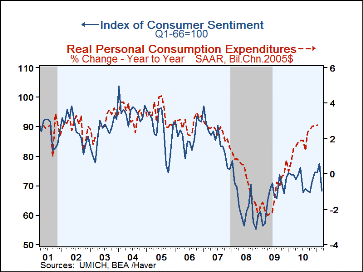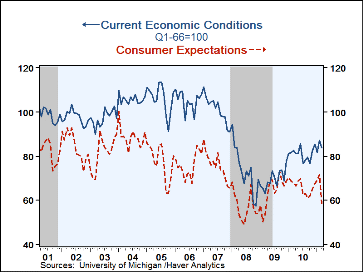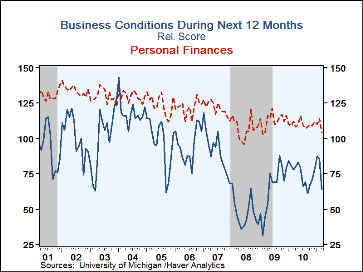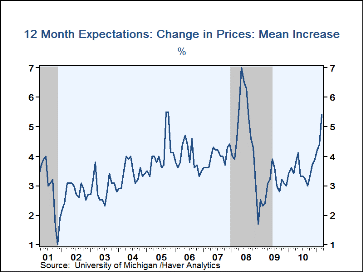 Global| Mar 11 2011
Global| Mar 11 2011U.S. Consumer Sentiment Slumps As Oil Prices Surge
by:Tom Moeller
|in:Economy in Brief
Summary
Consumers don't like it when they lose money. And the rise in oil prices reduces their spending power. The mid-March reading of consumer sentiment, from the University of Michigan, reflected that concern and declined 12.0% to 68.2 [...]
Consumers don't like it when they lose money. And the rise in oil prices reduces their spending power. The mid-March reading of consumer sentiment, from the University of Michigan, reflected that concern and declined 12.0% to 68.2 from 77.5 in February. A reading of 76.4 had been expected. During the last ten years there has been an 83% correlation between the level of sentiment and the y/y change in real consumer spending.
The expectations component of consumer sentiment fell the sharpest with an 18.6% m/m decline to 58.3, the lowest level in exactly two years. The decline was paced by a nearly one-quarter drop in expected business conditions during the next five years. That was followed by slightly less of a decline in expected conditions during the next year. The expected change in personal finances dropped 8.8%, again, to the lowest level in two years. The index of current economic conditions fell 3.8% and reversed much of the February gain. The reading of current personal finance dropped 11.0% but buying conditions were seen as having improved slightly.
Expected price inflation during the next year jumped a full percentage point to 5.4% with the surge in oil prices. The latest reading was the highest since July 2008 when energy prices similarly surged. During the next five-to-ten years, inflation is expected to average a lesser, but elevated, 3.7%. Respondents' view of government policy, which may eventually influence economic conditions, reversed nearly all of its February gain. Just 14 percent of respondents thought that a good job was being done by government while while an elevated 40% thought a poor job was being done.
The Reuters/University of Michigan survey data are not seasonally adjusted. The readings are based on telephone interviews with just over 300 households during early-to-mid November. The summary indexes are in Haver's USECON database with details in the proprietary UMSCA database. The expectations figure is in Haver's AS1REPNA database.
| University of Michigan (Q1'66 = 100) | Mid Mar |
Feb | Jan | Mar Y/Y | 2010 | 2009 | 2008 |
|---|---|---|---|---|---|---|---|
| Consumer Sentiment | 68.2 | 77.5 | 74.2 | -7.3% | 71.8 | 66.3 | 63.8 |
| Current Economic Conditions | 83.6 | 86.9 | 81.8 | 1.5 | 81.0 | 69.6 | 73.7 |
| Personal Finances | 81 | 91 | 85 | 5.2 | 79 | 67 | 78 |
| Buying Conditions For Large Household Goods | 134 | 133 | 126 | -1.5 | 130 | 112 | 112 |
| Expectations | 58.3 | 71.6 | 69.3 | -14.1 | 65.9 | 64.1 | 57.3 |
| Expected Change In Personal Finances | 104 | 114 | 110 | -7.1 | 110 | 113 | 107 |
| Business Conditions Next 12 Months | 64 | 85 | 87 | -17.9 | 75 | 65 | 48 |
| Business Conditions Next 5 Years | 63 | 87 | 80 | -23.2 | 79 | 78 | 73 |
Tom Moeller
AuthorMore in Author Profile »Prior to joining Haver Analytics in 2000, Mr. Moeller worked as the Economist at Chancellor Capital Management from 1985 to 1999. There, he developed comprehensive economic forecasts and interpreted economic data for equity and fixed income portfolio managers. Also at Chancellor, Mr. Moeller worked as an equity analyst and was responsible for researching and rating companies in the economically sensitive automobile and housing industries for investment in Chancellor’s equity portfolio. Prior to joining Chancellor, Mr. Moeller was an Economist at Citibank from 1979 to 1984. He also analyzed pricing behavior in the metals industry for the Council on Wage and Price Stability in Washington, D.C. In 1999, Mr. Moeller received the award for most accurate forecast from the Forecasters' Club of New York. From 1990 to 1992 he was President of the New York Association for Business Economists. Mr. Moeller earned an M.B.A. in Finance from Fordham University, where he graduated in 1987. He holds a Bachelor of Arts in Economics from George Washington University.
More Economy in Brief
 Global| Feb 05 2026
Global| Feb 05 2026Charts of the Week: Balanced Policy, Resilient Data and AI Narratives
by:Andrew Cates










